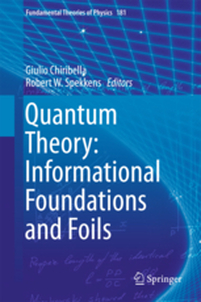Quantum Theory: Informational Foundations and Foils

Editors
Giulio Chiribella (The University of Hong Kong)
Robert W. Spekkens (Perimeter Institute for Theoretical Physics)
Content
Provides the first unified overview of the research area at the interface between Quantum Foundations and
Quantum Information.
Features 14 contributions from leading experts in the field.
Intended audience
The book is directed at researchers in physics, computer science, mathematics, and philosophy.
It can be used as the basis of a graduate course in Quantum Foundations.
Links to the chapters (arXiv version)
Chapter 0: G. Chiribella and R. W. Spekkens, Introduction
Chapter 1: W. K. Wootters, Optimal Information Transfer and Real-Vector-Space Quantum Theory
Chapter 2: B. Schumacher and M. K. Westmoreland, Almost Quantum Theory
Chapter 3: R. W. Spekkens, Quasi-Quantization: Classical Statistical Theories with an Epistemic Restriction
Chapter 4: M. P. Müller and L. Masanes, Information-Theoretic Postulates for Quantum Theory
Chapter 5: G. Chiribella, G. M. D'Ariano, and P. Perinotti, Quantum From Principles
Chapter 6: L. Hardy, Reconstructing Quantum Theory
Chapter 7: B. Dakic and C. Brukner, The Classical Limit of a Physical Theory and the Dimansionality of Space
Chapter 8: C. A. Fuchs and B. C. Stacey, Some Negative Remarks on Operational Approaches to Quantum Theory
Chapter 9: B. Coecke, R. Duncan, A. Kissinger, and Q. Wang, Generalised Compositional Theories and Diagrammatic Reasoning
Chapter 10: H. Barnum and A. Wilce, Post-Classical Probability Theory
Chapter 11: M. Pawlowski and V. Scarani, Information Causality
Chapter 12: M. Navascués, Macroscopic Locality
Chapter 13: A. Acín, M. Almeida, R. Augusiak, and N. Brunner, Guess Your Neighbor's Input: No Quantum Advantage but an Advantage for
Quantum Theory
Chapter 14: R. Colbeck and R. Renner, The Completeness of Quantum Theory for Predicting Measurement Outcomes
Giulio Chiribella (The University of Hong Kong)
Robert W. Spekkens (Perimeter Institute for Theoretical Physics)
Content
Provides the first unified overview of the research area at the interface between Quantum Foundations and
Quantum Information.
Features 14 contributions from leading experts in the field.
Intended audience
The book is directed at researchers in physics, computer science, mathematics, and philosophy.
It can be used as the basis of a graduate course in Quantum Foundations.
Links to the chapters (arXiv version)
Chapter 0: G. Chiribella and R. W. Spekkens, Introduction
Chapter 1: W. K. Wootters, Optimal Information Transfer and Real-Vector-Space Quantum Theory
Chapter 2: B. Schumacher and M. K. Westmoreland, Almost Quantum Theory
Chapter 3: R. W. Spekkens, Quasi-Quantization: Classical Statistical Theories with an Epistemic Restriction
Chapter 4: M. P. Müller and L. Masanes, Information-Theoretic Postulates for Quantum Theory
Chapter 5: G. Chiribella, G. M. D'Ariano, and P. Perinotti, Quantum From Principles
Chapter 6: L. Hardy, Reconstructing Quantum Theory
Chapter 7: B. Dakic and C. Brukner, The Classical Limit of a Physical Theory and the Dimansionality of Space
Chapter 8: C. A. Fuchs and B. C. Stacey, Some Negative Remarks on Operational Approaches to Quantum Theory
Chapter 9: B. Coecke, R. Duncan, A. Kissinger, and Q. Wang, Generalised Compositional Theories and Diagrammatic Reasoning
Chapter 10: H. Barnum and A. Wilce, Post-Classical Probability Theory
Chapter 11: M. Pawlowski and V. Scarani, Information Causality
Chapter 12: M. Navascués, Macroscopic Locality
Chapter 13: A. Acín, M. Almeida, R. Augusiak, and N. Brunner, Guess Your Neighbor's Input: No Quantum Advantage but an Advantage for
Quantum Theory
Chapter 14: R. Colbeck and R. Renner, The Completeness of Quantum Theory for Predicting Measurement Outcomes

